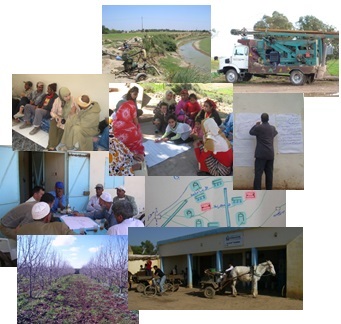Imen Kouki, Anissa Hanafi, Houda Mazhoud, Zhour Bouzidi, Fraj Chemak, Nicolas Faysse
https://doi.org/10.60569/hsoua-a7
Hors-série ouvrières agricoles, septembre 2025
Résumé
Les ouvrières agricoles sont devenues indispensables au fonctionnement de l’économie agricole en Tunisie. Cependant, les politiques publiques élaborées pour améliorer leurs conditions de travail et de vie n’ont en pratique que peu d’impacts. L’étude porte sur les relations que le travail des ouvrières agricoles les amène à avoir avec différents acteurs tout comme au sein de leur foyer : comment ces relations mettent en évidence certains rapports de pouvoir, et les impacts de ces relations sur le quotidien des ouvrières. Des entretiens ont été menés auprès de 35 ouvrières agricoles du gouvernorat de Béja. Les ouvrières évoluent dans un environnement où elles se trouvent dans une position de subordination dans leurs interactions avec les agriculteurs et les transporteurs. Au niveau familial, leur travail est accepté mais souvent ne se traduit pas pour autant par une autonomisation dans les prises de décision notamment quant à l’usage de leurs ressources ou aux choix de vie. L’environnement de travail des ouvrières agricoles est socialement connecté à leurs communautés d’origine : souvent les ouvrières travaillant ensemble se voient hors du travail et les transporteurs ont eux aussi des liens sociaux avec ces communautés. Cependant, malgré cette connexion, cet environnement est peu propice à une reconfiguration des relations de pouvoir, qui serait initiée par les femmes elles-mêmes, vers des relations plus équitables. Pour être effectives, les politiques publiques visant à améliorer les conditions de travail des ouvrières agricoles devront concevoir des dispositifs d’intervention centrés sur la transformation des relations entre les ouvrières d’une part, et les transporteurs et les agriculteurs d’autre part.
Mots clés : Béja, ouvrières agricoles, relations de travail, relations de pouvoir, Tunisie.
علاقات العمل لدى العاملات الزراعيات في تونس: بيئة مندمجة اجتماعيًا ولكن غير مهيأة لإعادة تشكيل علاقات السلطة
الملخص
أضحت العاملات الزراعيات عنصرًا أساسيًا في سير الاقتصاد الزراعي في تونس. غير السياسات العمومية التي وُضعت لتحسين ظروف عملهن وحياتهن كان لها تأثير محدود في الواقع. تتناول هذه الدراسة طبيعة العلاقات التي يفرضها عمل العاملات الزراعيات سواء مع مختلف الفاعلين في القطاع أو داخل محيطهنّ الأسري، وكيف تكشف هذه العلاقات عن أنماط متباينة من موازين السلطة، فضلًا عن انعكاساتها المباشرة على الحياة اليومية للعاملات. اعتمد البحث على مقابلات معمّقة مع خمسٍ وثلاثين (35) عاملة زراعية بولاية باجة. وقد أظهرت النتائج أنّ العاملات ينخرطن في بيئة تضعهنّ في موقع التبعية ضمن تفاعلاتهن مع الفلاحين وناقلي العمال. أمّا على الصعيد الأسري، فإنّ عملهن يُقبل من حيث المبدأ، غير أنّه لا يُترجم غالبًا إلى استقلالية فعلية في اتخاذ القرار، لاسيما فيما يتعلّق بالتحكم في الموارد المالية أو بتحديد مسارات الحياة. وتُظهر الدراسة أنّ بيئة العمل التي تنشط ضمنها العاملات الزراعيات تظل مرتبطة اجتماعيًا ببيئتهن المحلية؛ إذ غالبًا ما تتواصل العاملات خارج نطاق العمل، كما أن الناقلين أنفسهم تربطهم علاقات اجتماعية بمحيط العاملات. إلاّ أنّ هذا الارتباط، على أهميته، لا يوفّر أرضية كافية لإعادة تشكيل علاقات السلطة بشكل يتيح للعاملات أنفسهنّ الدفع نحو أنماط أكثر عدالة وإنصافا. ومن ثَمّ، فإنّ نجاعة السياسات العمومية الرامية إلى تحسين أوضاع العاملات الزراعيات تقتضي تصميم آليات تدخل تتمحور حول إعادة بناء طبيعة العلاقات بين العاملات من جهة، وبين الناقلين والفلاحين من جهة أخرى.
الكلمات المفتاحية: باجة؛ عاملات زراعيات؛ علاقات العمل؛ علاقات السلطة؛ تونس.
Labour Relations of Female Agricultural Workers in Tunisia: An Environment that is Socially Integrated but Offering Little Scope for the Transformation of Power Relations
Abstract
Female agricultural workers have become indispensable to the functioning of the agricultural economy in Tunisia. However, public policies designed to improve their working and living conditions have, in practice, limited impact. This study examines the relationships that agricultural work compels women workers to establish with various actors, as well as within their households: how these relationships highlight specific power dynamics, and the ways in which they affect the women’s daily lives. The research is based on in-depth interviews with 35 female agricultural workers from the governorate of Beja. Findings reveal that women workers operate in an environment that places them in a position of subordination in their interactions with farmers and transporters. At the household level, their work is accepted, yet rarely results in genuine autonomy in decision-making, particularly with regard to the use of resources or life choices. The working environment of female agricultural workers remains socially connected to their communities of origin: workers often interact outside the workplace, while transporters themselves maintain social ties with these communities. Nonetheless, despite this social embeddedness, the environment remains ill-suited to a reconfiguration of power relations initiated by women themselves towards more equitable relations. To be effective, public policies aiming to improve the conditions of female agricultural workers must therefore design intervention mechanisms that focus on transforming the relationships between the workers on the one hand, and the transporters and farmers on the other.
Keywords: Beja; female agricultural workers; labour relations; power relations; Tunisia.

